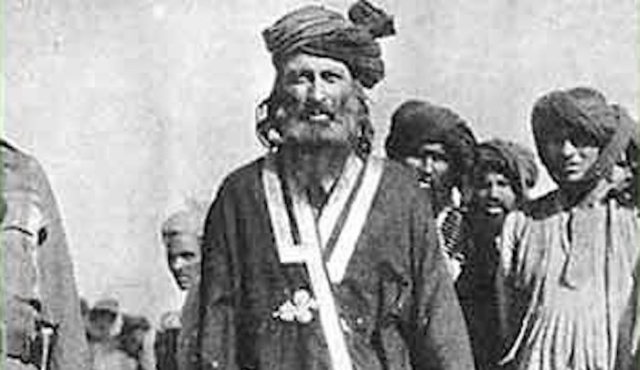Winston Churchill and Islam—Part Five

“The extraordinary credulity of the people is hardly conceivable. Had the Mad Mullah called on them to follow him to attack Malakand and Chakdara they would have refused. Instead he worked miracles. He sat at his house, and all who came to visit him, brought him a small offering of food or money, in return for which he gave them a little rice. As his stores were continually replenished, he might claim to have fed thousands. He asserted that he was invisible at night. Looking into his room, they saw no one. At these things they marvelled. Finally he declared he would destroy the infidel. He wanted no help. No one should share the honours. The heavens would open and an army would descend. The more he protested he did not want them, the more exceedingly they came. Incidentally he mentioned that they would be invulnerable; other agents added arguments. I was shown a captured scroll, upon which the tomb of the Ghazi — he who has killed an infidel — is depicted in heaven, no fewer than seven degrees above the Caaba [Ka’aba, in Mecca] itself. Even after the fighting — when the tribesmen reeled back from the terrible army they had assailed, leaving a quarter of their number on the field — the faith of the survivors was unshaken. Only those who had doubted had perished, said the Mullah, and displayed a bruise which was, he informed them, the sole effect of a twelve-pound shrapnel shell on his sacred person.
I pass with relief from the tossing sea of Cause and Theory to the firm ground of Result and Fact. The rumours and reports which reached the Malakand of the agitation in Upper Swat and among the surrounding tribes were fully appreciated by the Pathan Sepoys[1] of the garrison. As July advanced, several commanding officers were warned by their men, that great events were impending. Major Deane, the political agent, watched with great anxiety the daily progress of the fanatical movement. No one desires to be thought an alarmist, least of all on the frontier where there is always danger. At length, however, he felt compelled to officially report the disquieting signs. Warnings were then issued to the officers in charge of the various posts, and the troops were practised in taking up alarm stations. By the 23rd of July all had been informed that the aspect of affairs was threatening, and ordered to observe every precaution. But to the last everybody doubted that there would be a rising, nor did any one imagine that even should one occur, it would lead to more than a skirmish. The natives were friendly and respectful. The valley smiled in fertile prosperity. It was not strange, that none could foresee the changes a week would bring, or guess that in a few days they would be fighting for their lives; that they would carry fire and sword through the peaceful landscape; that the polo ground would be the scene of a cavalry charge, or that the cheery barbarians among whom they had lived quietly for so many months would become maddened and ferocious savages….[2]
Thus the thrust of Churchill’s argument is that rationality and civilization are threatened by a wild religious fanaticism emanating from Islam. Thus on the one hand we had the British Empire, representing Civilization and Progress, and on the other, barbarism of the Muslim tribesmen, who were opposed to these forces. The Ghazis, “mad with fanaticism”[3], were sweeping down the valley exciting the credulous masses all manipulated by their religious class.
In a remarkable passage in The Story of the Malakand Field Force, Churchill reveals the depth of his reading by citing the Chinese pilgrim, Fa-hien[4], when he contrasts the degradation of early Christianity, which was “convulsed by the Arian controversy. That pure religion…was defiled with the blood of persecution and degraded by the fears of superstition” with the Buddhists who were “placid people, thriving, industrious and intelligent; devoting their lives to the attainment of that serene annihilation which the word nirvana expresses”.[5] Again, the enemy was religious fanaticism, whether in Medieval Christianity or modern-day Islam in late nineteenth century India.
AUTHOR
RELATED ARTICLES:
Winston Churchill and Islam—Part One
Winston Churchill and Islam—Part Two
Winston Churchill and Islam—Part Three
Winston Churchill and Islam—Part Four
EDITORS NOTE: This Jihad Watch column is republished with permission. All rights reserved.
SOURCES:
[1] Sepoy: a word of Persian origin, sipahi meaning ‘soldier or horseman’. In early modern India sepoys belonged to infantry forces, riding on horses, and were serving under British or other European orders. Sepoys made up the vast majority of the British East India Company’s troops.
[2] MFF, pp.27-31.
[3] MFF, p.75.
[4] Now known as Faxian (法顯 [fà.ɕjɛ̀n]; 337 CE – c. 422 CE), also referred to as Fa-Hien, Fa-hsien and Sehi, was a Chinese Buddhist monk and translator who traveled by foot from China to India to acquire Buddhist texts. Starting his arduous journey about age 60, he visited sacred Buddhist sites in Central, South, and Southeast Asia between 399 and 412 CE, of which 10 years were spent in India.
See James Legge (1886, trans.), A Record of Buddhistic Kingdoms, Being an Account by the Chinese Monk Fâ-hien of His Travels in India and Ceylon (A.D. 399-414) in Search of the Buddhist Books of Discipline, Oxford at the Clarendon Press, 1886.
[5] MFF, p.93.


Leave a Reply
Want to join the discussion?Feel free to contribute!